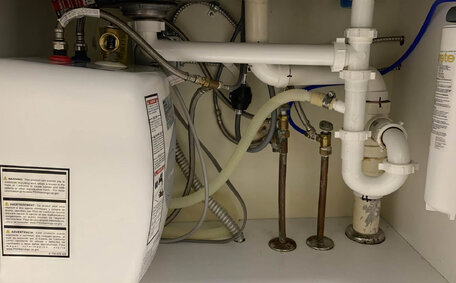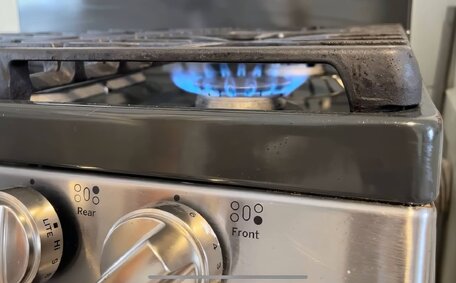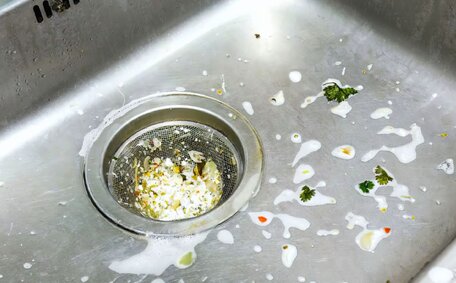What is Hard Water and How is it Measured?
Hard water is water high in dissolved minerals, specifically calcium and magnesium. These minerals can make their way into water as it flows over or through deposits of limestone, chalk, and certain types of sandstone or clay. The more calcium and magnesium present, the harder the water.
Water hardness is commonly measured in grains per gallon (gpg) or milligrammes per litre (mg/L). The hard water scale rates water hardness as follows:
- 0-3 gpg or 0-50 mg/L: Soft water
- 3-6 gpg or 50-120 mg/L: Moderately hard water
- 6-9 gpg or 120-180 mg/L: Hard water
- Over 9 gpg or 180 mg/L: Very hard water
Households can assess the impact of hard water using affordable home test kits. Knowing your water’s hardness level is crucial to prevent potential damage to water heaters, pipes, and appliances.
The Impact of Hard Water Scale Buildup on Hot Water Systems
Scale buildup from hard water can significantly affect hot water systems. As the hard water is heated, the minerals dissolve and then precipitate, forming solid deposits inside your water heater, as well as on the surfaces of pipes and heating elements.
This lime scale buildup acts as an insulating layer, which reduces the efficiency and performance of the hot water system. Studies show that even a light coating of scale buildup can reduce your hot water heater’s efficiency by up to 30%, driving up energy usage and utility costs.
Scale deposits force the heating elements of electric water heaters and the heat exchanger in gas models to overwork, reducing efficiency. This added strain on water heating drastically shortens the lifespan of these critical components and increases energy consumption.
As scale builds up over time, it restricts water flow throughout your heating element and pipes system. This results in a gradual loss of water pressure and hot water capacity for household needs.
Limescale and soap scum, a by-product of hard water, can also cause premature failure of fixtures like your faucets and showerheads. The buildup at critical junctures can obstruct water flow, leading to leaks, drips and other defects.
Regular maintenance is essential to minimise limescale damage to hot water systems. Effective solutions include installing water softener systems to remove hardness minerals, frequently flushing heaters to clear deposits, and replacing heating elements and anodes as needed.
Reduced Efficiency and Energy Waste
Limescale accumulation at the bottom of your hot water system’s tank impedes heat transfer and lowers energy efficiency. The mineral deposits form an insulating barrier between the heating elements and the water, reducing its lifespan by forcing the units to work much harder to heat up water heater hard.
This strain can lessen the life expectancy of your tank by up to half. This inefficiency can decrease energy efficiency by 30% or more, significantly driving up utility bills.
For instance, a 50-gallon electric water heater affected by hard water may incur over $150 in additional annual energy costs. The costs, potentially impacting how efficiently your water heater can operate, stack up even higher for larger households or commercial entities.
Beyond efficiency issues, low hot water flow caused by hard water blockages can frustrate daily activities like showering, washing dishes, or operating washing machines. The discernible loss of water pressure signals that scale from hard water hot systems is disrupting appliance function.
While hard water affects all heating systems, it particularly impacts tankless water heaters with their compact internal components. Mineral scale can obstruct key mechanisms, necessitating repairs or replacement.
To minimise efficiency loss and prevent damage, professionals recommend installing water softeners, routinely flushing heaters, and using scale inhibitors. However, if mineral buildup is significant, component replacement may be unavoidable.
Increased Maintenance Needs
Hard water greatly elevates the maintenance requirements of hot water systems. With the scale buildup occurring daily, households in a hard water area can accumulate up to 70kg of mineral deposits per year inside heater hard tanks and pipes.
To prevent a persistent hard water problem, more frequent descaling and flushing is necessary to remove scale buildup. Every 3-6 months, flush out water heaters by attaching a hose to the drain valve and routing it to exterior drainage. Inspect heating elements and anodes annually for corrosion and replace as required.
Water softeners mitigate hard water problems by extracting hardness minerals. However, existing buildup necessitates attentive maintenance. Check pipes and showerheads routinely for flow obstruction and clear blockages. Seek professional assistance if problems persist despite preventative efforts.
While regular maintenance incurs costs upfront, it spares far more expensive repairs replacements down the line. For homeowners, prioritising hot water system care preserves efficiency, lifespan, and performance despite hard water challenges.
Shortened Appliance Lifespans
The impact hard water your area has can lead to scale accumulation in appliances, resulting in shortened lifespans. As layers of mineral deposits build up inside water heaters, the strain on key components like heating elements intensifies. This accelerates wear and tear, potentially decreasing a unit’s lifespan by 2 years or more.
The heating elements of your water heater, often completely coated in thick mineral scale, are among the most visibly affected areas. Hard water also takes a toll on other interior parts like anodes, pressure relief valves, and tanks.
This strain causes them to degrade faster. The gradual deposit buildup interferes with proper functioning.
To maximise appliance longevity in hard water areas, periodic replacement of affected parts is recommended. Swapping out old heating elements or pressure relief valves can optimise performance and function. However, at some point, cumulative scale damage may necessitate a complete replacement of your system.
Installing water softeners or descalers helps curb hard water damage long-term. But existing buildup in your homes water will still need addressing through thorough flushing and professional cleaning. Without intervention, appliances invariably suffer shortened lifespans, losing efficiency and capacity well ahead of regular timelines.
Preventing and Mitigating Hard Water Damage
There are several effective methods homeowners can employ to prevent and mitigate hard water damage on hot water systems:
Install a Water Softener
Water softeners remove the minerals hard water carries, such as calcium and magnesium, through an ion exchange process. They protect and enhance the water your entire plumbing system receives by transforming hard water into soft water. While water softeners require periodic maintenance, they curb scale buildup and corrosion issues long-term.
Use Scale Inhibitors
Adding water softening chemicals is a robust way to protect your water heater from mineral scale damage. These liquid solutions bond with hardness ions, keeping them dissolved in the water, which affects your water heater by preventing settlement as deposits. They help safeguard pipes and heating elements when used properly.
Flush the Water Heater
Flushing your water heater hard water every 3-6 months clears out loose sediment and scale buildup. Simply attach a garden hose to the heater drain valve and route it to a nearby drain. Flushing extends the system’s lifespan by preventing sediment buildup inside the tank.
Replace Worn Parts
Components like heating elements, anodes and valves wear out faster when you don’t keep your water softener in good condition. Swapping out visibly corroded parts for new ones helps optimise performance and longevity.
Water Softeners
Water softeners offer an effective solution for combating hard water issues in homes. They work by removing the calcium, magnesium and other minerals that cause scale buildup and corrosion.
Water softeners use a process called ion exchange to transform hard water into softened water. Hardness mineral ions are exchanged with sodium or potassium ions, allowing the minerals to stay dissolved in the water rather than forming solid deposits.
There are two main types of water softeners:
- Salt-based softeners - These systems use salt to recharge sodium in the ion-exchange process and are cost-effective despite needing regular salt refills.
- Salt-free softeners - Instead of sodium, these systems use a catalytic technology to transform hardness minerals into inactive microscopic crystal particles that remain suspended in the water.
When selecting a water softener, consider factors like how can your home benefit from reduced water hardness, household size, water usage, existing plumbing, and maintenance needs. Our team at Jamisontown Plumbing would be happy to advise on the most suitable options for your home.
By preventing scale buildup and corrosion, water softeners help extend the lifespan your hot water systems enjoy and improve efficiency.
They also protect the plumbing network from cumulative hard water damage, ensuring optimal water heater operations. To learn more or schedule installation services, email or call Jamisontown Plumbing today.
Filtration Systems
A filtration system can provide a cleaner water supply and is an effective measure against hard water problems. Point-of-entry whole house filters remove hardness minerals before they enter your plumbing system, while point-of-use filters treat water at specific locations.
Filters work by straining out sediment and minerals as water passes through their porous media. Over time, built-up deposits will reduce flow rates. So regular filter replacements are vital.
For your whole home hard water protection, water softeners remain the most thorough option. But where softened water is not preferred, filtration can provide an alternative for managing hard water problems.
To determine the best filtration method for your needs, contact the team at Jamisontown Plumbing. Our water quality experts can advise on suitable solutions to improve appliance lifespans and efficiency.
Descaling and Maintenance
To descale your water heater, you’ll need:
- A garden hose
- White vinegar or citric acid descaling solution
- Bucket
- Cloths, sponge & gloves
Follow these steps:
- Turn off power to electric water heater or gas supply to gas system
- Attach hose to drain valve and route into a bucket
- Open the pressure relief valve
- Open drain valve and allow water to flow out until tank is empty
- Close drain valve and mix descaling solution in bucket as per product instructions
- Pour solution into tank through relief valve
- After 30 mins, reopen drain valve to flush solution and sediments
- Repeat as needed till water runs clear
- Use wet cloth to wipe interior clean
- Close valves, refill tank, restore power/gas
Prevent scale buildup by flushing your water heater every 3 months using a hose attached to the bottom drain valve to remove sediment. Check heating elements and anodes annually for corrosion. Replace if needed to optimise performance and longevity despite hard water.
Conclusion: Protecting Your Hot Water System Investment
Hard water can significantly shorten the lifespan and diminish the efficiency of hot water heaters tank over time. As scale deposits accumulate, water heaters and associated plumbing are forced to work harder to heat and transport water.
This strain leads to increased utility bills, reduced water pressure and flow, and a higher chance of leaks or other malfunctions. It also necessitates costly repairs or early replacement of appliances as critical components like heating elements and valves degrade faster.
Installing water softeners or filters, descaling heaters regularly, and swapping out worn parts are proactive maintenance steps to protect efficiency lifespan and curb damage. These maintenance steps, while representing an initial investment, yield long-term benefits in terms of improved efficiency, water savings, and extended equipment life.
For tailored advice on protecting your homes hot water system against hard water, contact the team at Jamisontown Plumbing today. Our water quality experts can inspect your setup, test your water’s hardness, and recommend suitable treatment solutions for your household’s needs.
We provide trusted maintenance, repairs and installation services to safeguard your plumbing for the long run. Email or call us to schedule an appointment.






